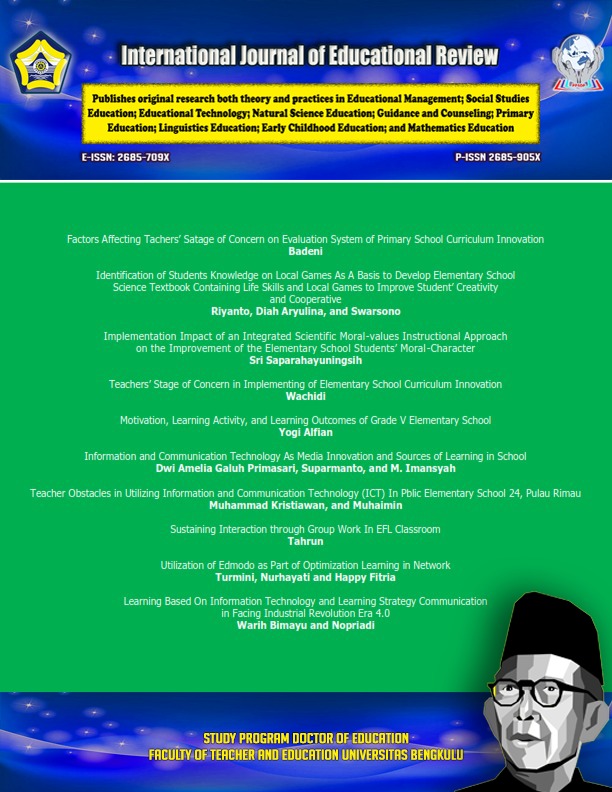Teacher’s Strategies to Protect Misbehavior of Students
DOI:
https://doi.org/10.33369/ijer.v2i2.10994Abstract
This study aimed at determining the types of student delinquency and preventive, repressive and curative actions in dealing with delinquency in SD Negeri 6 Pulau Rimau, Banyuasin. The data source of this study from 6 people, principal, 3 teachers and 2 student organizations. The method used descriptive qualitative and applied observation, documentation and interviews. The results showed that 1) the teacher's strategy in solving students' misbehavior is through struggles and countermeasures such as making school rules and penalties for students who do misbehavior; 2) the preventive action taken by the teacher is to always advise and remind the students of delinquency in school in advance. After that the teacher tries to motivate students not to do mischief again; 3) repressive actions taken by the teacher are by conducting guidance and direction as well as punishment with the aim of being able to discourage students; 4) curative action taken by both the teacher and the school as a healing attempt is to provide severe penalties to cooperate with the guardian's parents by calling to come to schoo; 5) the forms of juvenile delinquency in SD Negeri 6 Pulau Rimau were saying rude and dirty sentences, scribbling on school walls with inappropriate writing, not doing assignments, not keeping the school clean, conflicting with friends and damaging facilities school.References
Aat S. (2008). Peranan Pendidikan Agama Islam dalam Mencegah Kenakalan Remaja[The Role of Islamic Education in Preventing Juvenile Delinquency]. Jakarta: Raja Grafindo Persada
Andriani, S., Kesumawati, N., & Kristiawan, M. (2018). The Influence of the Transformational Leadership and Work Motivation on Teachers Performance. International Journal of Scientific & Technology Research, 7(7).
Daradjat, Z. (2011). Ilmu Pendidikan Islam [Islamic Education]. Jakarta: Bumi Aksara.
Djamarah. 2005. Strategi Belajar Mengajar [ Teaching and Learning Strategies]. Jakarta: Rineka Cipta
Fitria, H., Kristiawan, M., & Rasyid, A. (2019). The Educational Character on Instruction. Opción, Año 35, Especial No.21 (2019): 964-979
Fitria, H. (2018). The Influence Of Organizational Culture And Trust Through The Teacher Performance In The Private Secondary School In Palembang. International Journal of Scientific & Technology Research, 7(7).
Fitria, H., Mukhtar, M., & Akbar, M. (2017). The Effect of Organizational Structure And Leadership Style on Teacher Performance In Private Secondary School. IJHCM (International Journal of Human Capital Management), 1(02), 101-112.
Gunawan, I. (2013). Metode Penelitian Kualitatif [Qualitative Research Methods]. Jakarta: Bumi Aksara.
Kartini, K. (2005). Psikologi Remaja [Adolescent Psycholog]. Jakarta: Raja Grafindo Persada.
Kartini, K. (2008). Patologi Sosial 2 Kenakalan Remaja [Social Pathology 2 Juvenile Delinquency]. Jakarta: Raja Grafindo.
Khasanah, U., Kristiawan, M., & Tobari. (2019). The Implementation of Principals’ Academic Supervision In Improving Teachers’ Professionalism in the State Primary Schools. International Journal of Scientific & Technology Research, 8(8).
Kristiawan, M., & Tobari. (2017). The Characteristics of the Full Day School Based Elementary School. Transylvanian Review, 1(1).
Kristiawan, M., Nizarani., & Syamsidar. (2019). Role of School on Forming Character of Z-Generation Through Entrepreneurial Skills. International Journal of Scientific & Technology Research, 8(10).
Lian, B., Kristiawan, M., & Fitriya, R. (2018). Giving Creativity Room to Students through the Friendly School’s Program. International Journal of Scientific & Technology Research, 7(7).
Moleong, L.J. (2002). Metodologi Penelitian Kualitatif [Qualitative Research Methods]. Bandung: PT. Remaja Rosdakarya.
Moleong, L.J. (2011). Metodologi Penelitian Kualitatif Revisi [Qualitative Research Methods Revission]. Bandung: PT Remaja Rosdakarya.
Mudasir. (2011). Manajemen Kelas [Class Management]. Yogyakarta: Nusa Media
Mulyasa. (2012). Manajemen PAUD [PAUD Management], Bandung: PT. Remaja Rosdakarya
Mu’awanah, E. (2012). Bimbingan Konseling Islam [Islamic Counseling Guidance]. Teras. Yogyakarta.
Mulyono A. (2012). Anak Berkesulitan Belajar [Children with Learning Difficulties]. Jakarta: Rineka Cipta.
Murtiningsih, M., Kristiawan, M., & Lian, B. (2019). The Correlation Between Supervision of Headmaster and Interpersonal Communication With Work Ethos of the Teacher. European Journal of Education Studies.
Nugroho, S. P. dkk. 2014. The Role of Religion Teachers in Overcoming Student Delinquency. Manuscript of the Muhammadiyah University of Surakarta.
Panuju, P. & Ida, U. (2005). Psikologi Remaja [Adolescent Psychology]. Yogjakarta : Tiara Wacana.
Renata, R., Wardiah, D., & Kristiawan, M. (2018). The Influence of Headmaster’s Supervision and Achievement Motivation on Effective Teachers. International Journal of Scientific & Technology Research, 7(4).
Rochmah, E. Y. (2005). Psikologi Perkembangan [Developmental psychology]. Teras. Yogyakarta.
Salwa., Kristiawan, M., & Lian, B. (2019). The Effect of Academic Qualification, Work Experience and Work Motivation towards Primary School Principal Performance. International Journal of Scientific & Technology Research, 8(8).
Satiadarma, M. (2001). Persepsi Orang Tua Membentuk Perilaku Anak [Parents' Perception Shapes Children's Behavior]. Pustaka Populer. Jakarta.
Sayer, I. M., Kristiawan, M., & Agustina, M. (2018). Fairy Tale as a Medium for Children’s Character Cooperation Building. Al-Ta lim Journal, 25(2), 108-116.
Singgih D. G dan Gunarsa, S. D. (2006). Psikologi Untuk Membimbing [Psychology To Guide]. PT. BPK Gunung Mulia. Jakarta.
Sukmadinata, N. S. (2013). Pengembangan Kurikulum [Curriculum Development]. PT Remaja Rosdakarya. Bandung.
Yusuf, S. (2004). Psikologi Perkembanagan Anak dan Remaja [Child and Adolescent Developmental Psychology]. Bandung: Remaja Rosdakarya.
Wiyani. N.A (2013). Manajemen Kelas [Class Management]. Ar-Ruzz Media. Yogyakarta.
Downloads
Published
How to Cite
Issue
Section
License

This work is licensed under a Creative Commons Attribution-ShareAlike 4.0 International License.




